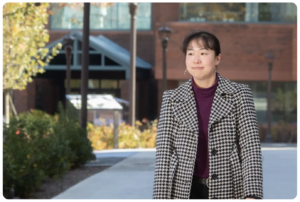New Fellowships Support High-Impact Cybersecurity Research

Cohort’s five faculty members will help grow the College’s work in cyber-physical systems security.
By Jason Maderer | May 10, 2023
Five faculty members will help grow the College of Engineering’s work in high-impact cyber-physical systems security (CPSS) as new Cybersecurity Fellows.
Fellows represent expertise in a variety of areas of CPSS, which addresses risks where cyber and physical worlds intersect. That includes the Internet of Things (IoT), industrial systems, smart grids, medical devices, autonomous vehicles, robotics, and more.
“As devices, systems, and the world continue to become more connected, cyber-related threats that were traditionally limited to the digital domain have made their way to physical systems,” said Raheem Beyah, dean of the College, Southern Company Chair, and a cybersecurity expert. “The College of Engineering has world-renowned cybersecurity and artificial intelligence researchers. This new cohort will continue to expand the College’s breadth of expertise and leadership in CPSS.”
The three-year fellowship was made possible by a gift from Kyle Seymour, a 1982 mechanical engineering graduate who retired as president and CEO of S&C Electric Company in 2020. Seymour wanted to help increase cybersecurity-related research and instruction within the College.
School chairs nominated potential fellows, who were evaluated and selected by a committee of senior cybersecurity researchers and College leaders.
Cybersecurity Fellows
 Iris Tien
Iris Tien
Williams Family Associate Professor
School of Civil and Environmental Engineering
Tien’s research focuses on the risk, reliability, and resilience of critical civil infrastructure systems. This includes water, power, gas, communications, and transportation systems. While traditional assessment of civil infrastructure has included only assessments of physical risks, Tien recently outlined the need to expand the risk profile to include cybersecurity and the potential for targeted attacks.
Tien’s lab group has pioneered new approaches for risk assessment of critical civil infrastructure systems under emerging cybersecurity threats and risks. Her team was the first to create a methodology to quantitatively assess cybersecurity risks for civil infrastructure such as smart transportation systems. This includes a method to assess 5G cybersecurity risks for connected and automated vehicles.
Leave a Reply